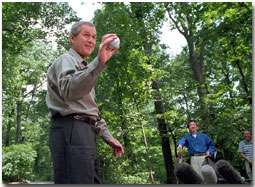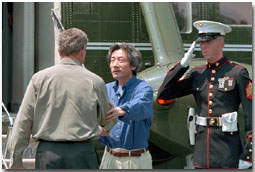
- Afghanistan
- Africa
- Budget Management
- Defense
- Economy
- Education
- Energy
- Environment
- Global Diplomacy
- Health Care
- Homeland Security
- Immigration
- International Trade
- Iraq
- Judicial Nominations
- Middle East
- National Security
- Veterans
|
Home >
News & Policies >
June 2001
|
For Immediate Release
Office of the Press Secretary
June 30, 2001
Remarks by the President and Prime Minister Koizumi of Japan in Photo Opportunity
Camp David, Maryland
![]()
11:09 A.M. EDT
THE PRESIDENT: It is my honor to welcome the Prime Minister of a -- of our close friend and ally. We had a two-hour meeting, very frank and open discussion. There's no question we will work together. There's no question in my mind our relationship will never be stronger than under our leadership. 
We talked about security matters. We talked about economics, and I want to praise the Prime Minister for his vision for reform of the Japanese economy. He's willing to make difficult choices. And that's what a leader does.
We talked about the environment. We talked about baseball. And we talked about the need to make sure that we work for a more peaceful world. And I'm confident we'll be able to do so.
So, Mr. Prime Minister, welcome.
PRIME MINISTER KOIZUMI: It was a wonderful meeting, and I believe we were able to establish a relationship of trust. It was a heart-to-heart meeting. This was truly a wonderful meeting. I did not feel -- or I did not, at the outset, believe that I would be able to establish such a strong relationship of trust with the President in my first meeting, which was much more than I expected.
In the Genoa summit, upcoming summit, and during the President's visit to Tokyo this fall, I am certain that we will be able to have even a closer relationship during our meetings.
Q Can we ask you a few questions, Mr. Prime Minister? I have a question for both of you, if you don't mind. First --
THE PRESIDENT: He's given one question, and of course, he asks two.
Q I thought it was one each. (Laughter.)
Sir, Mr. President, the Prime Minister acknowledges that his reforms will slow the economic growth in Japan, at least in the short-term. Wouldn't that threaten to drag down our economy, as well?
And to you, Mr. Prime Minister, do you still think that President Bush's position on the Kyoto Treaty is disappointing? And if so, why hasn't your country ratified it, or at least pledged to do so, without the United States? 
THE PRESIDENT: Let me first answer. First of all, the Prime Minister recognizes that there needs to be deep and meaningful reform. I talked to him about our experiences in Texas in the '80s, where we acted -- or the marketplace acted, we acted to remedy a situation in which we had bad loans, nonperforming assets, and there was some pain. But as a result of making the very difficult decisions, our economy was restructured and came back stronger than before.
I support the Prime Minister -- strongly support the Prime Minister's reform agenda for the economy. He reminded me that in the course of winning his election he had to appeal to the people of Japan, and made a very strong, direct appeal in laying out this aggressive agenda. And we support him strongly.
I believe, Ron, it's in our nation's best interests that the Japanese economy flourish, that it's strong and vibrant. And we had a very meaningful discussion, ranging from economic restructuring and reform to trade, the new global round of WTO, as well. And I believe he's the leader that Japan needs for this moment in her history.
He wants you to talk about Kyoto.
PRIME MINISTER KOIZUMI: I am not disappointed at the President's position. The President is enthusiastic about environmental issues and there is still time to discuss this issue.
I believe if the United States and Japan were to cooperate in dealing with environmental issues, we will be able to create means which will be more effective in dealing with the global warming issue and also in reducing our gas emissions. And I believe that in doing so, we will further be able to cooperate with the rest of the world.
Presently, I do not have the intention of proceeding without the cooperation of the United States. To the very last moment I will work with the United States in cooperating on environmental issues. There's still time left to discuss ways to cooperate with each other.
Q (Asked in Japanese.)
PRIME MINISTER KOIZUMI: No, we did not exchange nicknames, like Ron -- in the '80s. But we still had a meeting in which we were able to have a truly frank exchange of views in a friendly manner. It was very warm and it was a very, truly enjoyable, meaningful meeting.
Only people who are called Hen-Jins are able to proceed with reforms or making changes. But when I say Hen-Jin, this is not strange or eccentric, but this means extraordinary. (Laughter.)
Q Mr. President, are you concerned about the Vice President's health and do you think perhaps he should slow down?
THE PRESIDENT: Mr. Prime Minister, my great friend and the Vice President of our country went to the hospital today and put a pacemaker on his heart. It's a procedure that is viewed as something not out of the ordinary for the people who have had a heart condition. I'm told the operation went well. I'm going to speak to him in about an hour. I look forward to hearing his strong and steady voice on the phone.
No, I don't think he ought to slow down. I think he ought to listen to his body. I think he ought to -- which he has been doing. I think he ought to work at a pace that he is comfortable with. And I know Dick Cheney well, and if I were to say, you've got to slow down, Mr. Vice President, he's going to say, forget it, because he's got a job to do.
And he's a valuable member of my administration. He and his doctors made the right decision. And I'm told that he's going to be back to work Monday morning, and I look forward to seeing him in the Oval Office Monday morning. But I'm going to speak to him directly.
Q They did put it in?
THE PRESIDENT: They did put it in.
Q Mr. President, after the meeting with the Prime Minister for almost two hours now, did you find out why he's so popular in Japan? Did you wholeheartedly support his economic reform plans, which could result in very slow growth in Japan for as long as three years? Didn't you have any reservations at all about his plans -- namely, implications for the global economy and for the U.S. economy?
THE PRESIDENT: I have no reservations about the economic reform agenda that the Prime Minister is advancing. He talks about tackling some difficult issues that some leaders in the past refused to address.
I came -- I knew the Prime Minister was dynamic; I've heard that, I've read it. But you don't really realize how dynamic he is until you have a chance to witness his conversation. He's got a great sense of humor. He loves to laugh. But he's a courageous leader, as well. And I admire a person who recognizes that his duty is not to avoid, but to lead. His duty is to speak plainly to the people of his country. And I believe strongly that we will have a good relationship, not only to foster what's in the best interests of our country -- countries -- and in the region, but we'll have a good personal relationship, as well. After all, he's the only world leader I've ever played catch with, with a baseball.
Listen, thank you all for coming.
PRIME MINISTER KOIZUMI: In meeting with President Bush I instantly felt that with this person I will be able to give my frank views and I will be able to speak from the bottom of my heart. He has that kind of an atmosphere within himself. And with our common-shared values between Japan and the United States, I am certain that I will continue to be able to have these frank exchange of views with him.
THE PRESIDENT: Thank you, all.
END 11:21 A.M. EDT


